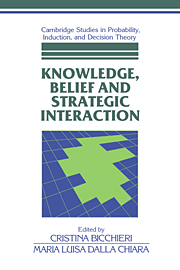Book contents
- Frontmatter
- Contents
- Preface
- List of contributors
- 1 Feasibility
- 2 Elicitation for games
- 3 Equilibrium, common knowledge, and optimal sequential decisions
- 4 Rational choice in the context of ideal games
- 5 Hyperrational games: Concept and resolutions
- 6 Equilibria and the dynamics of rational deliberation
- 7 Tortuous labyrinth: Noncooperative normal-form games between hyperrational players
- 8 On consistency properties of some strongly implementable social choice rules with endogenous agenda formation
- 9 Algorithmic knowledge and game theory
- 10 Possible worlds, counterfactuals, and epistemic operators
- 11 Semantical aspects of quantified modal logic
- 12 Epistemic logic and game theory
- 13 Abstract notions of simultaneous equilibrium and their uses
- 14 Representing facts
- 15 Introduction to metamoral
- 16 The logic of Ulam's games with lies
- 17 The acquisition of common knowledge
- 18 The electronic mail game: Strategic behavior under “almost common knowledge”
- 19 Knowledge-dependent games: Backward induction
- 20 Common knowledge and games with perfect information
- 21 Game solutions and the normal form
- 22 The dynamics of belief systems: Foundations versus coherence theories
- 23 Counterfactuals and a theory of equilibrium in games
20 - Common knowledge and games with perfect information
Published online by Cambridge University Press: 05 November 2011
- Frontmatter
- Contents
- Preface
- List of contributors
- 1 Feasibility
- 2 Elicitation for games
- 3 Equilibrium, common knowledge, and optimal sequential decisions
- 4 Rational choice in the context of ideal games
- 5 Hyperrational games: Concept and resolutions
- 6 Equilibria and the dynamics of rational deliberation
- 7 Tortuous labyrinth: Noncooperative normal-form games between hyperrational players
- 8 On consistency properties of some strongly implementable social choice rules with endogenous agenda formation
- 9 Algorithmic knowledge and game theory
- 10 Possible worlds, counterfactuals, and epistemic operators
- 11 Semantical aspects of quantified modal logic
- 12 Epistemic logic and game theory
- 13 Abstract notions of simultaneous equilibrium and their uses
- 14 Representing facts
- 15 Introduction to metamoral
- 16 The logic of Ulam's games with lies
- 17 The acquisition of common knowledge
- 18 The electronic mail game: Strategic behavior under “almost common knowledge”
- 19 Knowledge-dependent games: Backward induction
- 20 Common knowledge and games with perfect information
- 21 Game solutions and the normal form
- 22 The dynamics of belief systems: Foundations versus coherence theories
- 23 Counterfactuals and a theory of equilibrium in games
Summary
INTRODUCTION
It is by now rather well understood that the notion of common knowledge (first introduced by Lewis 1969 and later formalized by Aumann 1976) plays a central role in the theory of games. (An event E is common knowledge between two individuals, if each knows E, each knows the other knows E, etc. …) Indeed, most justifications of Nash's (1951) equilibrium concept usually include (perhaps only implicitly) the assumption that it is common knowledge among the players that both the Nash equilibrium in question will be played by all and that all players are expected utility maximizers. (We shall henceforth call expected utility maximizers “rational.”) We hope to illustrate in an informal manner that there is in fact a large class of extensive-form games, in which each of which it is not possible for rationality to be common knowledge throughout the game.
The consequences of this for many well-known extensive-form refinements of Nash equilibrium are quite serious. Consider, for example, Selten's (1965) notion of subgame perfect Nash equilibrium. The requirements on a solution here are not only that the strategies form a Nash equilibrium of the game as a whole, but also that the strategies induce on every proper subgame a Nash equilibrium. If, however, there are proper subgames beginning at (singleton) information sets at which it is not possible for rationality to be common knowledge, then Nash behavior in that subgame can no longer be justified on common-knowledge grounds.
- Type
- Chapter
- Information
- Knowledge, Belief, and Strategic Interaction , pp. 345 - 354Publisher: Cambridge University PressPrint publication year: 1992
- 1
- Cited by



